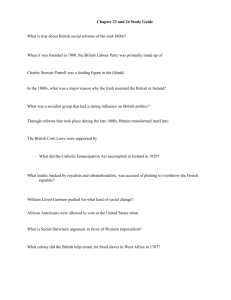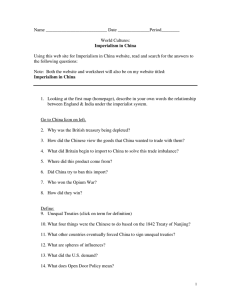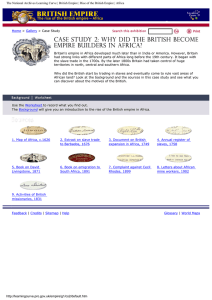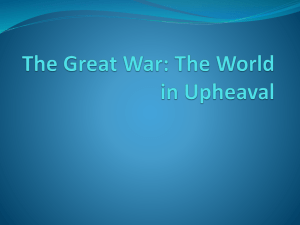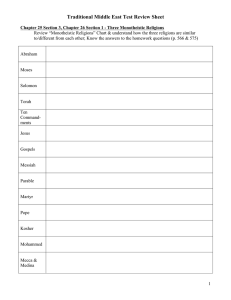The New Imperialism By: Maddie Lipan
advertisement
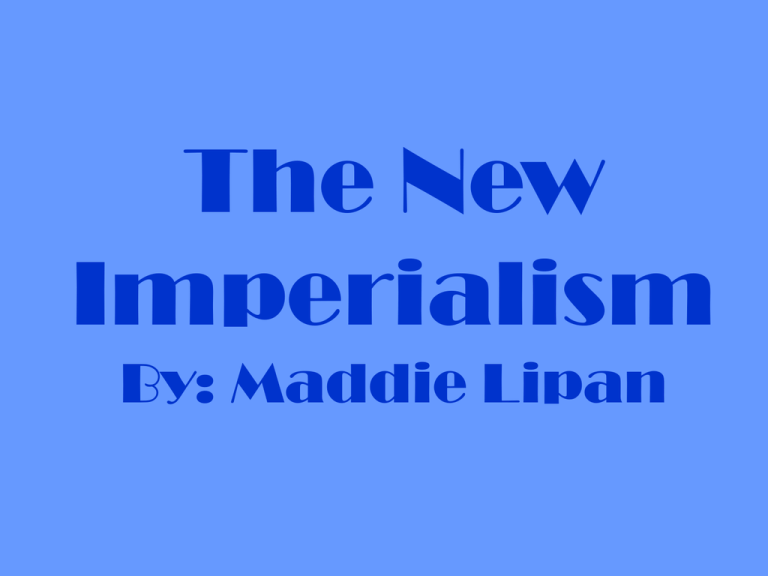
The New Imperialism By: Maddie Lipan A WesternDominated World The New Imperialism & Its Causes • Imperialism- the domination by one country of the • • • • political, economic, or cultural life of another country/region. Between 1500’s & 1800’s, Europe had little influence on people of China, India, or Africa. 1800’s- Europe gained power. Industrial Revolution had greatly enriched European economies. The new imperialism exploded out of a combination of causes. Economic Interests • Manufacturers wanted access to natural resources such as rubber, petroleum, manganese for steel, and palm oil for machinery. • Hoped for new markets where they could sell their factory goods. • Colonies offered a valuable outlet for Europe’s growing population. Political & Military Interests • Steam-powered merchant ships and naval vessels needed bases around the world to take on coal and supplies. • Western leaders claimed that colonies were needed for national security. Humanitarian Goals & Social Darwinism • Missionaries, doctors and colonial officials believed they had a duty to spread what they saw as the blessings of western civilization, including its medicine, law & Christian religion. • Many Westerners applied Darwin’s ideas about natural selection and survival of the fittest to human societies. The Success of Western Imperialism • In Europe, imperial expansion found favor with all classes, from bankers and manufacturers to workers. Forms of Imperial Rule • Took several forms • France & Britain, the leading imperial powers, developed different kinds of colonial rule. • French- practiced direct rule sending officials and soldiers to administer their colonies and turn them into Rench provinces. • British- indirect rule to govern their colonies, they used chiefs, sultans or other local rulers. • Encouraged children to get local education in Britain. Protectorates & Sphere of Influence • Protectorate- local rulers were left in place but were expected to follow the advice of European advisers on issues such as trade or missionary activity. • Sphere of Influence- an area which an outside power claimed exclusive investment or trading privileges. The Partition of Africa AFRICA in the 1800’s • North Africa- included: Sahara and fertile land along the Mediterranean • Remained under the rule of the declaring Ottoman empire. • West Africa- preached jihad [holy struggle, to revive and purify Islam] • Manly grassland, forest region. Many states arose. • East Africa- Islam influenced the East. Cargoes were mainly slaves and captives marched from the interior to the coast to be shipped as slaves to the Middle East. • Ivory and Copper from Central Africa were exchanged for goods such as cloth and firearms form India. • Southern Africa- was in turmoil. Shaka united nations. Although his conquests caused many problems such as wars and chaos. Slave Trade • East African slave trade, continued to the Middle East. • Some people in Britain & the United States helped freed slaves resettle in Africa. • Later on some freed blacks from the United States settled in Liberia. European Contracts Increase • Explorers- fascinated by geography, but had little understanding of the peoples they met. [Daring Advantages Mungo Park & Richard Burton] • Missionaries- followed the explorers (Catholic and Protestant) Their goal was to convert people to Christianity, build schools and medical clinics alongside churches. • Livingstone- Dr. David Livingstone wrote about many peoples he met with more sympathy and less bias than most Europeans. He crisscrossed Africa. A Scramble for Colonies • Berlin Conference- to avoid any issues, European powers met at an international conference in 1884. • European powers recognized Leopold’s private claims to the Congo Free State but called for free trade on the Congo and Niger rivers. • European power could not claim any part of Africa unless it had set up a government office there. • Africans had no say!! Horror Conference • Leopold and other wealthy Belgians, meantime, exploited the riches of the Congo, including its copper, rubber, and ivory. • There were horrifying reports of Belgian overseers brutalizing villagers. Forced to work for nearly nothing, they were badly beaten. • Africans were given little or no role in either the government or either the government or the economy of the colony. Britain Takes Its Share • Britain took chunks of West and East Africa. It gained control of Egypt and pushed south into Sudan. • British united the Cape Colony and the former Boer republics into the Union of South Africa. • The new constitution set up a government run by whites and laid the foundation for a system of complete racial segregation that would remain in force until 1993. • Boer War- The discovery of gold and diamonds in the Boer lands led to conflict with Britain. It involved bitter guerrilla fighting. Lasted from 1899-1902. • British won!! Africans Resist Imperialism • Europeans met armed resistance across the continent. • Nehanda- she became a military leader who was captured and executed, but she inspired later generations to fight for freedom. • Reforming ruler- Menelik II started to modernize the country. • During the Age of Imperialism, a westerneducated African elite (upper class) emerged. European Challenges to the Muslim World Stresses in the Muslim World • Empires in Decline- Central governments had lost control over powerful groups such as landowning nobles, military elites, and urban craft guilds. • Islamic Reform Movement- The Wahhabi movement in Arabia rejected the schools of theology and law that had emerged in the Ottoman empire. The rule was to always respect Muhammad’s teachings. • European Imperialism- Europeans powers won treaties giving them favorable trading terms. They then demanded special rights for Europeans residing in Muslim lands. Problems for the Ottoman Empire • Ottoman Empire extended across the Middle East. Many pashas (provincial rulers) • Subject people threatened to break away. In the Balkans, Greeks, Serbs, Romanians, and Bulgarians gained their independence. • European states sought to benefit from the slow crumbling of the Ottoman empire. • Ottoman rulers had seen the need for reform and looked to the West for ideas. • They built railroads, improved education and hired European officers to train the military. • A group of liberals formed a movement called “the Young Turks”, they believed that reform was the only way to save the empire. • Genocide- a deliberate attempt to destroy an entire religious or ethnic group. Egypt Seeks to Modernize • Muhammad Ali is known as the “father of modern Egypt”- he introduced a number of political and economic reforms. • The Suez Canal links the Mediterranean and Red seas. • Britain made Egypt a protectorate. Under British influence Egypt continued to modernize. Iran and the European Powers • The Qajar who ruled Iran exercised absolute power like the Safavids before them. • The government improved finances, sponsored the building of telegraph lines and railroads, and even experimented with a liberal constitution. • Concessions- special economic rights given to foreign powers. The British Take Over India East India Company and Sepoy Rebellion • As Mughal empire was at its height, India was home to many people and cultures. • The British took advantage of Indian divisions by encouraging competition and disunity among rival princes. • The East India Company’s main goal in India was to make money, and leading officials often got rich. • The British pressed for social change • The East India Company required sepoys (Indian soldiers in its service) • The Sepoys Rebellion swept against north and central India. They took terrible revenge for their earlier losses, torching villages and slaughtering unarmed Indians. • Parliament ended the rule of the East India Company and put India directly under the British crown. British Colonial Rule • A British viceroy in India governed in the name of the queen, and British officials held the top positions in the civil service and army. • The British flooded India with inexpensive, machine-made textiles, ruining India’s once-prosperous hand-weaving industry. • British encouraged Indians to become farmers to grow cash crops, such as cotton and jute that could be sold on the world market. • Clearing new farmland led to massive deforestation (cutting of trees • British introduced medical improvements & new farming. • There were many benefits of British Rule, such as the legal system to promote justice for Indians, railroads helped Indians move around the country. • The upper class especially benefited from some British policies they sent their sons to British schools, where they trained for posts in the civil service and military. Different Views on Culture • • • • • Indians had different attitudes toward the British. Some liked western ideas, some didn’t. Ram Mohun Roy felt that India could learn from the West. Roy is known as the founder of Indian nationalism. Roy condemned some traditions, such as rigid caste distinctions, child marriage, sati, and purdah (the isolation of women in separate quarters) • Western writers and philosophers borrowed ideas from Hinduism and Buddhism. Indian Nationalism • Indian National Congress members were mostly professionals and business leaders who believed in peaceful protest o gain their ends. • They looked forward to eventual self-rule but supported western-style modernization. • Muslims formed the Muslim League to pursue their own goals unlike before when they worked with the Hindus for the self-rule. China and the New Imperialism The Trade Issue • China enjoyed a trade surplus (exporting more than imported) • Westerners had a trade deficit (buying more from the Chinese than they sold to them) with China. • The Opium War British traded with India for Chinese tea. Chinese had been addicted to the drug & sooner or later Chinese warships clashed with British merchants which triggered the war. • Chinese were easily defeated. • Britain made China accept the Treaty of Najing. British received huge indemnity (payment for losses in the war) • China opened 5 ports for trade and granted British citizens in China extraterritoriality (right to live under their own laws and be tried in their own courts) • The treaty was the 1st of a series of “unequal treaties”, that made China make concessions to western power. Internal Problems • The Taiping Rebellion- the most devastating peasant revolt in history. • Leader Hong Huiquan wanted to establish a “Heavenly Kingdom of Great Peace”—The Taiping • Influenced by the teachings of Christian missionaries endured social ideas that Chinese leaders considered radical. • The Taiping rebels won control of large parts of China. • The Taiping Rebellion almost toppled the Qing dynasty. • The Qing government survived, but had to share power with regional commanders. • Caused between 20million – 30 million deaths. • Russia seized lands in northern China. Reform Efforts • Scholar- officials disapproved of the ideas of western missionaries. • Ci Xi- Empress gained power, was deeply committed to Confucian’s ideas. • Reformers launched a “self- strengthening movement”- they imported western technology. • However, this movement limited progress because the government didn’t rally behind it. • In 1894, Japanese pressure on China led to the SinoJapanese War. • It ended in disaster for China, with Japan gaining the island of Taiwan. • The crushing defeat revealed China’s weakness. • Western powers moved swiftly to carve out spheres of influence along the Chinese coast. • British took the Yangzi River valley. • French acquired the territory near their colony of Indochina. • Germany and Russia gained territory in northern China. • U.S. didn’t take part in the carving up of China. Hundred Day Reform • A young emperor, Guang Xu launched the Hundred Day Reform. • New laws were made to modernize the civil service exams, streamline government, and encourage new industries. • Reforms affected schools, the military, and bureaucracy. • Conservatives rallied against the reform effort and that led to the emperor being imprisoned. The Qing Dynasty Falls • 1899- a group of Chinese had formed a secret society, the Righteous Harmonious Fists. • Their goal was to drive out the “foreign devils” who were polluting land with their un- Chinese ways. • The Boxers attacked foreigners across China western powers and Japan organized a multinational force, which crushed the Boxers & rescued foreigners besieged in Beijing. • Sun Yixian- studied in the West. • His goal was to rebuild China on “Three Principles of the People.” • 1st principle- nationalism, freeing China from foreign domination. • 2nd principle- democracy. • 3rd principle- “livelihood,” economic security for all Chinese. • When Ci Xi died in 1908 a 2 year old boy inherited the throne (China went into chaos) • In December 1911, Sun Yixian was named president of the new Chinese republic. 1. The Industrial Revolution encouraged imperialism by creating a need for a) scientists and engineers. b) workers. c) raw materials and new markets. d) foreign investment capital. 2. Which empire developed in West Africa in the early 1800s? a) Zulus b) Asante c) Yao d) Herero 3. At the Berlin Conference, it was agreed that a European power could not claim any part of Africa unless a) it relinquished land in other parts of the world. b) it paid high duties to the African government. c) it signed a treaty to abolish slave trade. d) it had set up a government office in the area. 4. What did Dr. David Livingstone believe was the only way to end the slave trade in Africa? a) to offer slave owners premium prices for the freedom of their slaves b) to capture and punish the ringleaders of the slave trade c) to open the interior of Africa to Christianity and trade d) to have slaves band together in revolt against the African government 5. Which of the following problems threatened the Ottoman empire in the early 1800s? a) drought and famine b) nationalism and European powers eager to seize Ottoman lands c) military coups and assassinations d) socialism and worker revolts Answers 1. C 2. B 3. D 4. C 5. B

